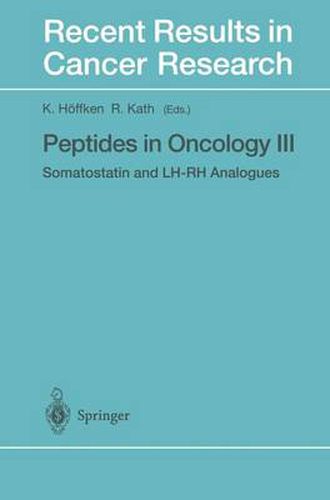Readings Newsletter
Become a Readings Member to make your shopping experience even easier.
Sign in or sign up for free!
You’re not far away from qualifying for FREE standard shipping within Australia
You’ve qualified for FREE standard shipping within Australia
The cart is loading…






This title is printed to order. This book may have been self-published. If so, we cannot guarantee the quality of the content. In the main most books will have gone through the editing process however some may not. We therefore suggest that you be aware of this before ordering this book. If in doubt check either the author or publisher’s details as we are unable to accept any returns unless they are faulty. Please contact us if you have any questions.
Interference with protein-mediated intra- and intercellular pathways has become a major goal of preclinical and clinical research. A ,rapidly increasing numBer of peptides are known to be responsible for endo-, para-and autocrine sig- nal transduction. These peptides and their receptors have been studied with regard to their cell growth stimulatory ac- tion and their impact on differentiation. In parallel, peptide antagonists are being investigated in terms of their potential role in preclinical and clinical application. Thus, biotherapy might improve the clinical outcome of patients with tumors that respond to the respective hormonal manipulation. Among the numerous peptides of interest somatostatin (somatotropin release inhibitory factor) and the luteinizing hormone releasing hormone (LH-RH) have been the topic of intensive research during recent years. In this third vol- ume of peptides in oncology, experts in the field exten- sively review and update the mechanisms of action of so- matostatin and LH -RH -analogues in oncology. Somatostatin and its various short-and long-acting ana- logues have the unique feature of suppressing and inhibit- ing a wide range of cellular processes including cell prolif- eration. Receptors for these peptides which belong to the family of neuropeptides or neurotransmitters, are widely distributed, a feature which is not in keeping with the gen- eral view of a growth hormone regulatory system. LH -RH analogues play an established role in curative (adjuvant) and palliative treatment of hormone sensitive tumors.
$9.00 standard shipping within Australia
FREE standard shipping within Australia for orders over $100.00
Express & International shipping calculated at checkout
This title is printed to order. This book may have been self-published. If so, we cannot guarantee the quality of the content. In the main most books will have gone through the editing process however some may not. We therefore suggest that you be aware of this before ordering this book. If in doubt check either the author or publisher’s details as we are unable to accept any returns unless they are faulty. Please contact us if you have any questions.
Interference with protein-mediated intra- and intercellular pathways has become a major goal of preclinical and clinical research. A ,rapidly increasing numBer of peptides are known to be responsible for endo-, para-and autocrine sig- nal transduction. These peptides and their receptors have been studied with regard to their cell growth stimulatory ac- tion and their impact on differentiation. In parallel, peptide antagonists are being investigated in terms of their potential role in preclinical and clinical application. Thus, biotherapy might improve the clinical outcome of patients with tumors that respond to the respective hormonal manipulation. Among the numerous peptides of interest somatostatin (somatotropin release inhibitory factor) and the luteinizing hormone releasing hormone (LH-RH) have been the topic of intensive research during recent years. In this third vol- ume of peptides in oncology, experts in the field exten- sively review and update the mechanisms of action of so- matostatin and LH -RH -analogues in oncology. Somatostatin and its various short-and long-acting ana- logues have the unique feature of suppressing and inhibit- ing a wide range of cellular processes including cell prolif- eration. Receptors for these peptides which belong to the family of neuropeptides or neurotransmitters, are widely distributed, a feature which is not in keeping with the gen- eral view of a growth hormone regulatory system. LH -RH analogues play an established role in curative (adjuvant) and palliative treatment of hormone sensitive tumors.